- Home
- Sandra Cisneros
My Wicked Wicked Ways: Poems Page 3
My Wicked Wicked Ways: Poems Read online
Page 3
She lived mistress.
Died solitary.
There is as well
the cousin with the famous
how shall I put it?
profession.
She ran off with the colonel.
And soon after,
the army payroll.
And, of course,
grandmother’s mother
who died a death of voodoo.
There are others.
For instance,
my father explains,
in the Mexican papers
a girl with both my names
was arrested for audacious crimes
that began by disobeying fathers.
Also, and here he pauses,
the Cubano who sells him shoes
says he too knew a Sandra Cisneros
who was three times cursed a widow.
You see.
An unlucky fate is mine
to be born woman in a family of men.
Six sons, my father groans,
all home.
And one female,
gone.
OTHER COUNTRIES
And at times we feel a little like exiles; a woman feels like that when she does not live up to the image of her required by the times, when she does not interpret it, and hence searches for paths, for other “countries” where life for her will be different from that in her own country, in the homeland given her by her mother’s womb.
—MARIA ISABEL BARRENO, MARIA TERESA HORTA, AND MARIA VELHO DA COSTA, THE THREE MARIAS
Letter to Ilona from the South of France
for Ilona Den Blanken Nesti
Ilona, I have been thinking
and thinking of you since I went away,
dragging you with me across the South of France
and into Spain. Then back again.
I ran away to an island off the coast,
tiny jewels of fields beneath the jewel of sky—
and lost myself one night in crumpled poppies.
Odd for such a city poet like me
to find such comfort in the dark—
I who always feared it—and yet
I loved the way it wrapped me like a skin.
All those stars, Ilona. And wind.
Field illumined by those poppies.
Yes, that was good.
I wanted to bring that back forever,
wrap it in a velvet cloth to show you.
The wind from Africa. The field of poppies.
The way my bicycle hummed the distance.
And for me, Ilona, who has never known
the liberty of darkness, who has never
let go fear, how do I explain a joy this elemental,
simple like your daughter’s hand outlined in crayon.
And yet I think you understand
my first sky full of stars—
you who are a woman—
the wind from Africa, the field of poppies,
the night I let slip from my shoulders.
To wander darkness like a man, Ilona.
My heart stood up and sang.
Ladies, South of France—Vence
At 4 P.M. the promenade begins.
The wives who walk with husbands
and the ones without
who do not walk at all.
They gather like dusty birds
beneath their paisley
and polka-dot
and plaid and blue-checked
and yellow and plum-colored
parasols.
And in their penny-whistle French
each evening when the sunlight dims,
they sing.
December 24th, Paris—Notre-Dame
The Seine runs along.
Merrily, merrily.
The river. The rain.
Water into water.
A blue umbrella fading into fog.
A child into his mother’s arms.
Buttresses leaping delirious.
Wind through the vein of trees.
The rain into the river.
Tomorrow they might find a body here—
unraveled like a poem,
dissolved like wafer.
Say the body was a woman’s.
Ophelia Found.
Undid the easy knot and spiraled.
Without a sound.
A year ends
merrily. Merrily
another one begins.
I go out into the street once more.
The wrists so full of living.
The heart begging once again.
Beautiful Man — France
I saw a beautiful man today
at the café.
Very beautiful.
But I can’t see
without my glasses.
So I ask the woman next to me.
Yup, she says, he’s beautiful.
But I don’t believe her
and go to see for myself.
She’s right.
He is.
Do you speak English?
I say to the beautiful man.
A little, the beautiful man says to me.
You are beautiful, I say,
No two ways about it.
He says beautifully, Merci.
Postcard to the Lace Man—The Old Market, Antibes
To tell the truth,
I can’t remember your name.
It’s those Catalán eyes
I can’t let go of.
That and the memory
of an inky tea
sweetened with orange water,
the sticky perfume
of a cigarette
from Persia,
those photos of Tangiers.
I forgot to tell you.
I have a great respect
for wives.
Especially yours.
Au revoir, mon ami.
C’est la vie.
That afternoon
at the Musée Picasso—
a pretty memory and enough
for me.
Letter to Jahn Franco—Venice
You were full of stories.
Was that red jacket of yours really
once Bob Marley’s?
The man you live with actually
your brother?
Those three women from Valencia
all your lovers?
It doesn’t matter.
Venice was a good adventure.
Dancing through canals.
Ducking bridges from a motorboat
that sped delirious at 4 a.m.
under a laughing moon.
So I let you down.
Didn’t give in and fall
under the spell of a bona fide
Venetian artist on the street,
replete with easel. A modern
Casanova—wow.
I remember that pathetic last ciao
you gave me at the railway station—
you said you felt as if
you’d bought an ice-cream cone
and it had fallen to the ground
before you had a chance to taste it.
Bought.
Always that metaphor somehow or other.
And what was I
except an item not for sale.
Well.
After all, a man invests his time,
his money even,
though this was fifty-fifty.
I owed nothing.
Tell me,
one artist to another,
what does a woman owe a man,
and isn’t freedom what you believe in?
Even the freedom to say no?
At least you did the night before
when we clinked our glasses to the Muses
and our common god.
I don’t know.
For all that talk of liberation
I still felt that seam of anger
when I danced with you
and sometimes not with you at all.
What if I hadn
’t gone home alone?
Say my eye had gotten tangled with another’s.
Or maybe yours.
It might’ve happened that way.
You never know.
But to tell the truth
I think true nature rises
when the body dances.
Perhaps that’s why I never
have one partner,
prefer to dance alone.
No, I won’t
come to Sardinia with you.
Or even Spain.
The truth is that uncomfortable next morning
we had nothing to say to one another.
Hardly a word until we reached the station.
An ice-cream cone.
In case you change your mind, you said.
I know you won’t, but just in case,
I’ll wait in Venice seven days.
You were right about one thing—
I didn’t come back.
To Cesare, Goodbye
Cesare,
with those Medici eyes
you could go far
I said.
But you’ve never
been away from Tuscany
except for a cousin’s wedding
in Milano.
I said come with me to Spain.
Spain you said and laughed.
Too far away—
even Rome is too expensive.
You were waiting for
that job at the post office,
a letter from an uncle
that might help.
Maybe one day
I will see you in America
I said.
Maybe
you said.
And laughed.
Ass
for David
My Michelangelo!
What Bernini could compare?
Could the Borghese estate compete?
Could the Medici’s famed aesthete
produce as excellent and sweet
as this famous derriere.
Did I say derriere?
Derriere too dainty.
Buttocks much too bawdy.
Cheeks so childishly petite.
Buns, impudently funny.
Rear end smacking of collision.
Ah, misnomered beauty.
Long-suffering
butt of jokes,
object of derision.
Pomegranate and apple
hath not such tempting
allure to me
as your hypnotic
anatomy.
Then
am I victim
of your spell,
bound since mine eyes
did first espy
that paradise of symmetry.
And like Pygmalion transfixed,
who sincere believed
desire could unfix
that alabaster chastity,
grieved the enchantment
of those small cruel hips—
those hard twin bones—
that house such enormous
happiness.
Trieste—Ciao to Italy
for Natale Mancari
Maybe we should’ve fallen in love.
Or pretended to be.
What was there to lose
except a few hours of sleep.
You needed me.
But that wasn’t reason enough.
And love is no charity,
no tin cup and yellow pencils.
What did we expect?
Trieste was full of disappointments—
a town that got lucky and had the sea.
And how could I explain in raggedy Italian
I still liked you.
Maybe when your train gets into Milano
and mine to Dubrovnik, we’ll perhaps regret
what didn’t happen. Maybe.
But any town with a name
this sad deserves nothing
but a stony memory.
Peaches—Six in a Tin Bowl, Sarajevo
If peaches had arms
surely they would hold one another
in their peach sleep.
And if peaches had feet
it is sure they would
nudge one another
with their soft peachy feet.
And if peaches could
they would sleep
with their dimpled head
on the other’s
each to each.
Like you and me.
And sleep and sleep.
Hydra Night—House on Fire
When houses burn here
you just watch.
There is nothing
but the sea
for irony.
Cinders wild as flies.
Rooster crowing day too early.
Night illumined. Moonless sky.
I worked with others
dragging furniture outdoors—
books, tables, lamps—
to save what could be saved.
Water drizzled from a skinny hose.
Buckets passed from
hand to hand to hand.
Somebody cursed in Greek.
A neighbor gave me her sweater,
asked if I was cold.
First the grape arbor came down.
And then the windows spoke.
We watched until the roof
sighed twice, then died.
Then one by one went home
to dream of fire.
Hydra Coming Down in Rain
I’m not certain
but I imagine even
mountains melt.
In Hydra
they come down
in rain
and down
on cobbled
steps
inside your shoes
unless your boots
are rubber
red.
Bleed
from lemon trees,
whitewashed walls,
wooden shutters,
gravel,
bougainvillea,
clay tile roof,
pomegranate,
copper gutter,
slippery flagstones,
fresh donkey shit,
and jasmine flowers.
Down and down
until the mountain
meets the port
and spills
into
the sea.
Fishing Calamari by Moon
for A. Stavrou
At the bullfights as a child
I always cheered for the bull,
that underdog of underdogs,
destined to lose, and I tell you
this, Andoni, so you’ll understand,
though we are miles from bullrings.
The Greek moon a lovely thing
to look at above our boat.
We are an international crew tonight.
Greek sea, African Queen, you, me.
But I am sad. Probably the only
foolish fisherman to cry
because we’ve caught a calamari.
You didn’t tell me how
their skins turn black
as sorrow. How they suck the air
in dying, a single terrifying cry
terrible as tin.
You will cook it in oil.
You will slice it and serve it
for our lunch tomorrow.
Endaxi—okay.
But tonight my heart
goes out to the survivors,
to the ones who get away.
To all underdogs everywhere,
bravo, Andoni. Olé.
Moon in Hydra
Women fled.
Tired of the myth
they had to live.
They no longer wait
for their Theseus
to rescue, then
abandon them.
Instead,
they take
the first boat out
to Athens.
Live alone.
No longer Hydra women
bound to stone.
Smoke rises
from the Athens shore,
and some say
it’s the fumes of autos,
motor scooters,
factory pollution.
But I think
it’s an ancient rage.
Women who grew tired
beneath the weight of years
that would not buckle,
break nor bend.
One Last Poem for Richard
December 24th and we’re through again.
This time for good I know because I didn’t
throw you out—and anyway we waved.
No shoes. No angry doors.
We folded clothes and went
our separate ways.
You left behind that flannel shirt
of yours I liked but remembered to take
your toothbrush. Where are you tonight?
Richard, it’s Christmas Eve again
and old ghosts come back home.
I’m sitting by the Christmas tree
wondering where did we go wrong.
Okay, we didn’t work, and all
memories to tell the truth aren’t good.
But sometimes there were good times.
Love was good. I loved your crooked sleep
beside me and never dreamed afraid.
There should be stars for great wars
like ours. There ought to be awards
and plenty of champagne for the survivors.
After all the years of degradations,
the several holidays of failure,
Died solitary.
There is as well
the cousin with the famous
how shall I put it?
profession.
She ran off with the colonel.
And soon after,
the army payroll.
And, of course,
grandmother’s mother
who died a death of voodoo.
There are others.
For instance,
my father explains,
in the Mexican papers
a girl with both my names
was arrested for audacious crimes
that began by disobeying fathers.
Also, and here he pauses,
the Cubano who sells him shoes
says he too knew a Sandra Cisneros
who was three times cursed a widow.
You see.
An unlucky fate is mine
to be born woman in a family of men.
Six sons, my father groans,
all home.
And one female,
gone.
OTHER COUNTRIES
And at times we feel a little like exiles; a woman feels like that when she does not live up to the image of her required by the times, when she does not interpret it, and hence searches for paths, for other “countries” where life for her will be different from that in her own country, in the homeland given her by her mother’s womb.
—MARIA ISABEL BARRENO, MARIA TERESA HORTA, AND MARIA VELHO DA COSTA, THE THREE MARIAS
Letter to Ilona from the South of France
for Ilona Den Blanken Nesti
Ilona, I have been thinking
and thinking of you since I went away,
dragging you with me across the South of France
and into Spain. Then back again.
I ran away to an island off the coast,
tiny jewels of fields beneath the jewel of sky—
and lost myself one night in crumpled poppies.
Odd for such a city poet like me
to find such comfort in the dark—
I who always feared it—and yet
I loved the way it wrapped me like a skin.
All those stars, Ilona. And wind.
Field illumined by those poppies.
Yes, that was good.
I wanted to bring that back forever,
wrap it in a velvet cloth to show you.
The wind from Africa. The field of poppies.
The way my bicycle hummed the distance.
And for me, Ilona, who has never known
the liberty of darkness, who has never
let go fear, how do I explain a joy this elemental,
simple like your daughter’s hand outlined in crayon.
And yet I think you understand
my first sky full of stars—
you who are a woman—
the wind from Africa, the field of poppies,
the night I let slip from my shoulders.
To wander darkness like a man, Ilona.
My heart stood up and sang.
Ladies, South of France—Vence
At 4 P.M. the promenade begins.
The wives who walk with husbands
and the ones without
who do not walk at all.
They gather like dusty birds
beneath their paisley
and polka-dot
and plaid and blue-checked
and yellow and plum-colored
parasols.
And in their penny-whistle French
each evening when the sunlight dims,
they sing.
December 24th, Paris—Notre-Dame
The Seine runs along.
Merrily, merrily.
The river. The rain.
Water into water.
A blue umbrella fading into fog.
A child into his mother’s arms.
Buttresses leaping delirious.
Wind through the vein of trees.
The rain into the river.
Tomorrow they might find a body here—
unraveled like a poem,
dissolved like wafer.
Say the body was a woman’s.
Ophelia Found.
Undid the easy knot and spiraled.
Without a sound.
A year ends
merrily. Merrily
another one begins.
I go out into the street once more.
The wrists so full of living.
The heart begging once again.
Beautiful Man — France
I saw a beautiful man today
at the café.
Very beautiful.
But I can’t see
without my glasses.
So I ask the woman next to me.
Yup, she says, he’s beautiful.
But I don’t believe her
and go to see for myself.
She’s right.
He is.
Do you speak English?
I say to the beautiful man.
A little, the beautiful man says to me.
You are beautiful, I say,
No two ways about it.
He says beautifully, Merci.
Postcard to the Lace Man—The Old Market, Antibes
To tell the truth,
I can’t remember your name.
It’s those Catalán eyes
I can’t let go of.
That and the memory
of an inky tea
sweetened with orange water,
the sticky perfume
of a cigarette
from Persia,
those photos of Tangiers.
I forgot to tell you.
I have a great respect
for wives.
Especially yours.
Au revoir, mon ami.
C’est la vie.
That afternoon
at the Musée Picasso—
a pretty memory and enough
for me.
Letter to Jahn Franco—Venice
You were full of stories.
Was that red jacket of yours really
once Bob Marley’s?
The man you live with actually
your brother?
Those three women from Valencia
all your lovers?
It doesn’t matter.
Venice was a good adventure.
Dancing through canals.
Ducking bridges from a motorboat
that sped delirious at 4 a.m.
under a laughing moon.
So I let you down.
Didn’t give in and fall
under the spell of a bona fide
Venetian artist on the street,
replete with easel. A modern
Casanova—wow.
I remember that pathetic last ciao
you gave me at the railway station—
you said you felt as if
you’d bought an ice-cream cone
and it had fallen to the ground
before you had a chance to taste it.
Bought.
Always that metaphor somehow or other.
And what was I
except an item not for sale.
Well.
After all, a man invests his time,
his money even,
though this was fifty-fifty.
I owed nothing.
Tell me,
one artist to another,
what does a woman owe a man,
and isn’t freedom what you believe in?
Even the freedom to say no?
At least you did the night before
when we clinked our glasses to the Muses
and our common god.
I don’t know.
For all that talk of liberation
I still felt that seam of anger
when I danced with you
and sometimes not with you at all.
What if I hadn
’t gone home alone?
Say my eye had gotten tangled with another’s.
Or maybe yours.
It might’ve happened that way.
You never know.
But to tell the truth
I think true nature rises
when the body dances.
Perhaps that’s why I never
have one partner,
prefer to dance alone.
No, I won’t
come to Sardinia with you.
Or even Spain.
The truth is that uncomfortable next morning
we had nothing to say to one another.
Hardly a word until we reached the station.
An ice-cream cone.
In case you change your mind, you said.
I know you won’t, but just in case,
I’ll wait in Venice seven days.
You were right about one thing—
I didn’t come back.
To Cesare, Goodbye
Cesare,
with those Medici eyes
you could go far
I said.
But you’ve never
been away from Tuscany
except for a cousin’s wedding
in Milano.
I said come with me to Spain.
Spain you said and laughed.
Too far away—
even Rome is too expensive.
You were waiting for
that job at the post office,
a letter from an uncle
that might help.
Maybe one day
I will see you in America
I said.
Maybe
you said.
And laughed.
Ass
for David
My Michelangelo!
What Bernini could compare?
Could the Borghese estate compete?
Could the Medici’s famed aesthete
produce as excellent and sweet
as this famous derriere.
Did I say derriere?
Derriere too dainty.
Buttocks much too bawdy.
Cheeks so childishly petite.
Buns, impudently funny.
Rear end smacking of collision.
Ah, misnomered beauty.
Long-suffering
butt of jokes,
object of derision.
Pomegranate and apple
hath not such tempting
allure to me
as your hypnotic
anatomy.
Then
am I victim
of your spell,
bound since mine eyes
did first espy
that paradise of symmetry.
And like Pygmalion transfixed,
who sincere believed
desire could unfix
that alabaster chastity,
grieved the enchantment
of those small cruel hips—
those hard twin bones—
that house such enormous
happiness.
Trieste—Ciao to Italy
for Natale Mancari
Maybe we should’ve fallen in love.
Or pretended to be.
What was there to lose
except a few hours of sleep.
You needed me.
But that wasn’t reason enough.
And love is no charity,
no tin cup and yellow pencils.
What did we expect?
Trieste was full of disappointments—
a town that got lucky and had the sea.
And how could I explain in raggedy Italian
I still liked you.
Maybe when your train gets into Milano
and mine to Dubrovnik, we’ll perhaps regret
what didn’t happen. Maybe.
But any town with a name
this sad deserves nothing
but a stony memory.
Peaches—Six in a Tin Bowl, Sarajevo
If peaches had arms
surely they would hold one another
in their peach sleep.
And if peaches had feet
it is sure they would
nudge one another
with their soft peachy feet.
And if peaches could
they would sleep
with their dimpled head
on the other’s
each to each.
Like you and me.
And sleep and sleep.
Hydra Night—House on Fire
When houses burn here
you just watch.
There is nothing
but the sea
for irony.
Cinders wild as flies.
Rooster crowing day too early.
Night illumined. Moonless sky.
I worked with others
dragging furniture outdoors—
books, tables, lamps—
to save what could be saved.
Water drizzled from a skinny hose.
Buckets passed from
hand to hand to hand.
Somebody cursed in Greek.
A neighbor gave me her sweater,
asked if I was cold.
First the grape arbor came down.
And then the windows spoke.
We watched until the roof
sighed twice, then died.
Then one by one went home
to dream of fire.
Hydra Coming Down in Rain
I’m not certain
but I imagine even
mountains melt.
In Hydra
they come down
in rain
and down
on cobbled
steps
inside your shoes
unless your boots
are rubber
red.
Bleed
from lemon trees,
whitewashed walls,
wooden shutters,
gravel,
bougainvillea,
clay tile roof,
pomegranate,
copper gutter,
slippery flagstones,
fresh donkey shit,
and jasmine flowers.
Down and down
until the mountain
meets the port
and spills
into
the sea.
Fishing Calamari by Moon
for A. Stavrou
At the bullfights as a child
I always cheered for the bull,
that underdog of underdogs,
destined to lose, and I tell you
this, Andoni, so you’ll understand,
though we are miles from bullrings.
The Greek moon a lovely thing
to look at above our boat.
We are an international crew tonight.
Greek sea, African Queen, you, me.
But I am sad. Probably the only
foolish fisherman to cry
because we’ve caught a calamari.
You didn’t tell me how
their skins turn black
as sorrow. How they suck the air
in dying, a single terrifying cry
terrible as tin.
You will cook it in oil.
You will slice it and serve it
for our lunch tomorrow.
Endaxi—okay.
But tonight my heart
goes out to the survivors,
to the ones who get away.
To all underdogs everywhere,
bravo, Andoni. Olé.
Moon in Hydra
Women fled.
Tired of the myth
they had to live.
They no longer wait
for their Theseus
to rescue, then
abandon them.
Instead,
they take
the first boat out
to Athens.
Live alone.
No longer Hydra women
bound to stone.
Smoke rises
from the Athens shore,
and some say
it’s the fumes of autos,
motor scooters,
factory pollution.
But I think
it’s an ancient rage.
Women who grew tired
beneath the weight of years
that would not buckle,
break nor bend.
One Last Poem for Richard
December 24th and we’re through again.
This time for good I know because I didn’t
throw you out—and anyway we waved.
No shoes. No angry doors.
We folded clothes and went
our separate ways.
You left behind that flannel shirt
of yours I liked but remembered to take
your toothbrush. Where are you tonight?
Richard, it’s Christmas Eve again
and old ghosts come back home.
I’m sitting by the Christmas tree
wondering where did we go wrong.
Okay, we didn’t work, and all
memories to tell the truth aren’t good.
But sometimes there were good times.
Love was good. I loved your crooked sleep
beside me and never dreamed afraid.
There should be stars for great wars
like ours. There ought to be awards
and plenty of champagne for the survivors.
After all the years of degradations,
the several holidays of failure,

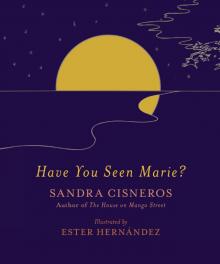 Have You Seen Marie?
Have You Seen Marie?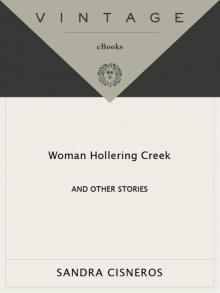 Woman Hollering Creek: And Other Stories
Woman Hollering Creek: And Other Stories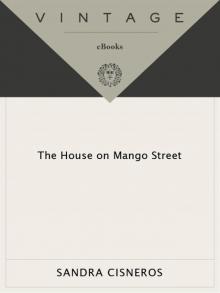 The House on Mango Street
The House on Mango Street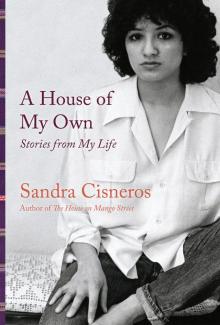 A House of My Own: Stories From My Life
A House of My Own: Stories From My Life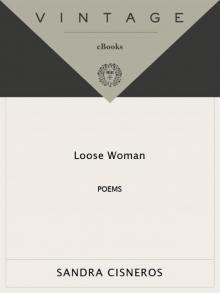 Loose Woman
Loose Woman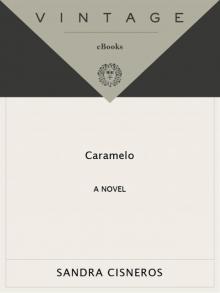 Caramelo
Caramelo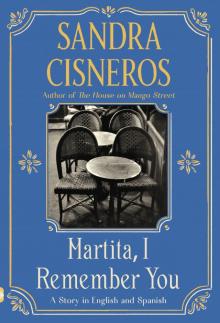 Martita, I Remember You/Martita, te recuerdo
Martita, I Remember You/Martita, te recuerdo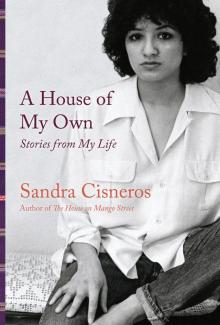 A House of My Own
A House of My Own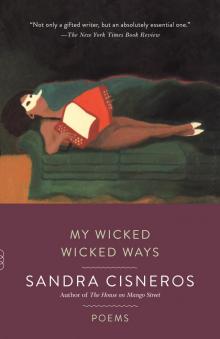 My Wicked Wicked Ways
My Wicked Wicked Ways